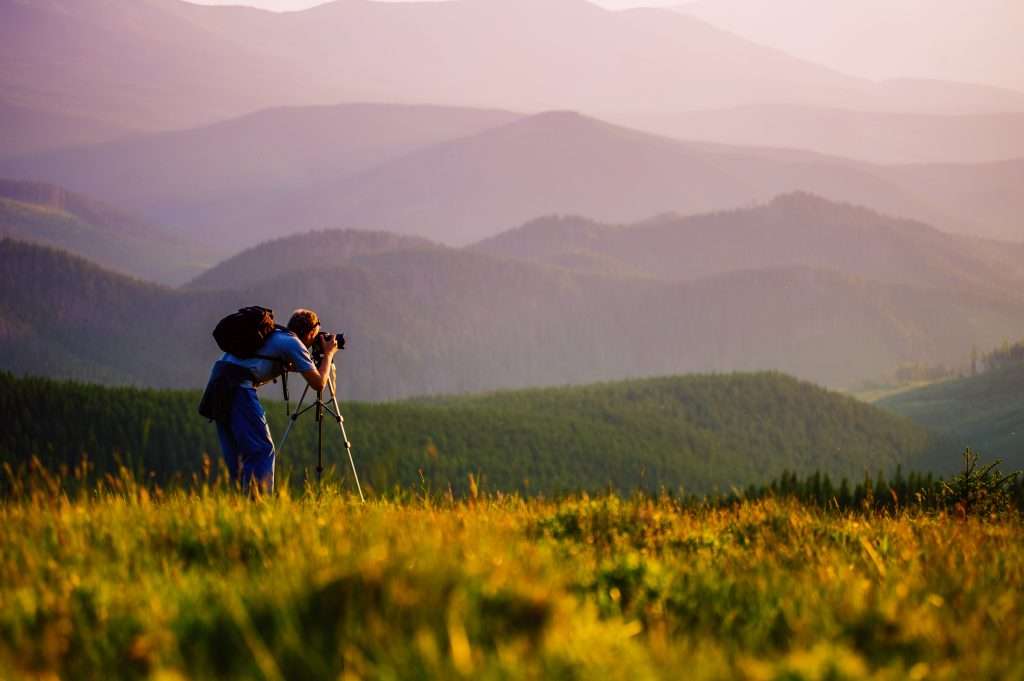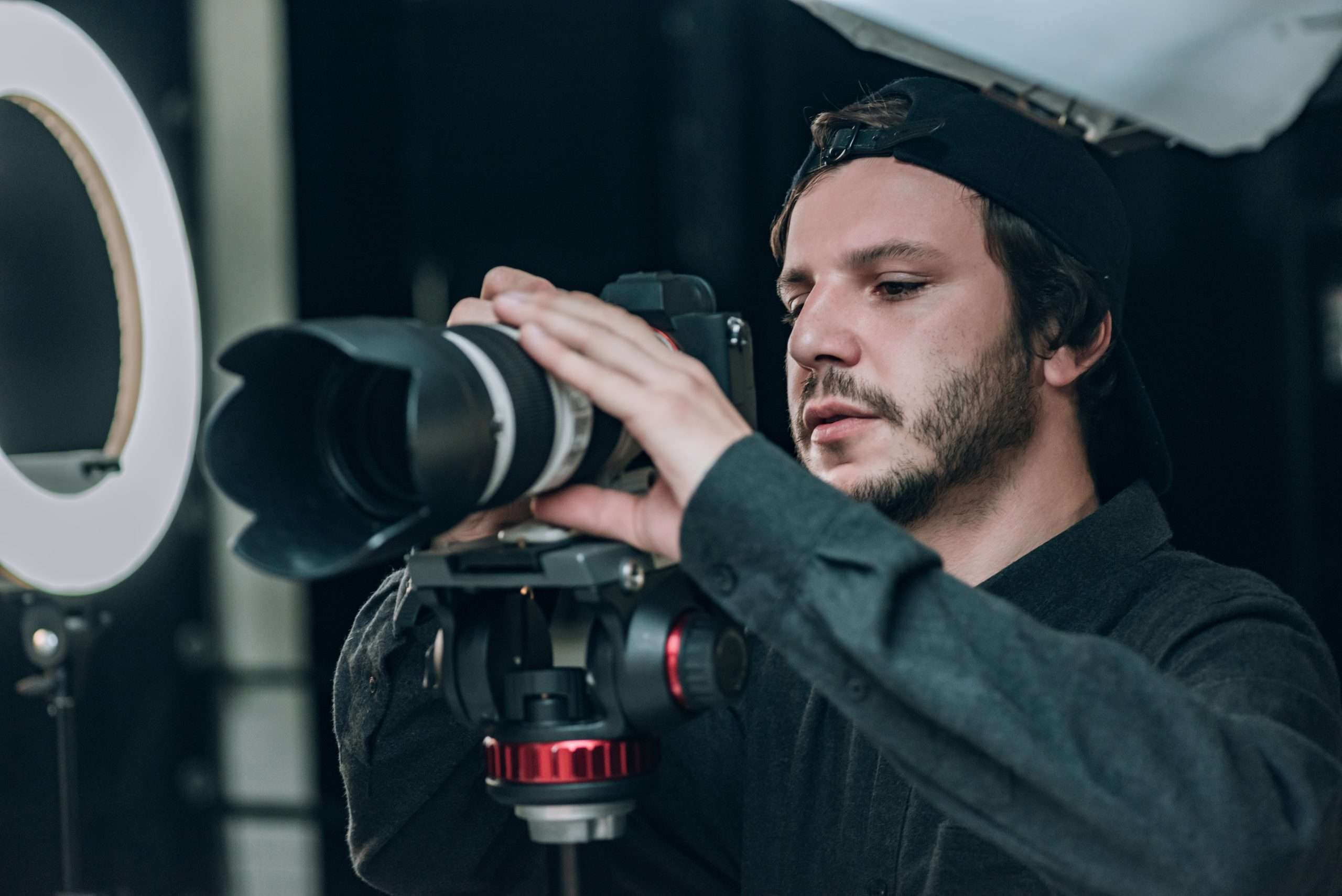The different terms used to refer to a camera operator include cameraman, camera operator, and cinematographer.
Cameraman
A cameraman is a key member of any film or TV crew. They are the ones behind the lens, working with the camera. Their job has other names too. Some people call them a camera operator.
This person uses a video camera to record scenes for films, music videos and TV shows. Being a cameraman means carrying out lots of tasks during filming. They not only press the big red record button, but also have to plan each shot carefully.
It’s common for people to mix up the roles of a cinematographer and a cameraman. These jobs may seem similar but they do different things on set. The main role of a cinematographer involves planning how the movie will look – that’s all about light and moving the camera in artistic ways.
The next time you watch your favourite show or movie, give thought to who might be behind that camera lens! It could be done by an unsung hero: A skilled Cameraman!
Camera Operator
A camera operator, also known as a cameraman, is the person who controls the camera on a film set. Their job includes recording footage for things like films, TV shows, music videos and commercials.
They hold the camera and make sure it’s pointing at what needs to be filmed. By looking through the viewfinder and pressing the record button they can capture all of the action.
The work done by a camera operator is very important in filmmaking or any type of video production. Not only do they take care of their equipment, but they also work closely with the director and other members of crew.
This helps to make sure that every scene looks just right. Although their role differs from that of a cinematographer who plans how each shot will look; it’s equally crucial as it brings everyone’s ideas to life!
Cinematographer
A cinematographer plays a big role in films. This person decides the visual look and style of a film. They pick the right camera, lens and lighting. They work directly with the director to create each shot’s look.
A cinematographer is often called a Director of Photography or DP for short. Their job is more than just pointing and shooting a camera. It involves art, science, problem-solving, and leadership skills too!
What’s the Difference between a Cameraman and a Videographer?

A cameraman and a videographer are not the same. A cameraman films scenes for movies, TV shows, or live events. They work with a team on set and follow the plan for each shot. They focus only on shooting what is in front of them.
On the other hand, a videographer may do more than just shoot video. A videographer often works alone or with a small group to make videos from start to finish. That means they plan shots, edit film clips and add sound or effects too.
In short, while both jobs handle cameras to record video content, their roles can differ based on their tasks at work sites.
Responsibilities of a Camera Operator
The camera operator’s main responsibilities include operating the camera, framing shots, and controlling camera movements. Their expertise plays a crucial role in capturing visually appealing shots that enhance the overall storytelling of a film or video.
Explore further to discover the key differences between a cameraman and cinematographer!
Operating the camera
Using the video or film camera starts with knowing how to hold it. It’s more than just looking through the lens and pressing a button. You point the camera at what you want to film.
The viewfinder lets you see exactly what the camera sees.
You have to make sure that everything in front of your lens looks good before hitting record. This is called framing shots. Learning how to zoom in and out makes sure that no action is missed.
Movements need control so as not to shake or blur the images captured on film or video.
Framing shots
Framing shots is a big task for a camera operator. We use this skill to make every shot look good. It’s all about what is seen in each shot. To do it well, we need to think about where people and things are in the shot.
We must also decide how much light and shadow there should be. With good framing, we can tell stories better with our cameras.
Controlling camera movements
Moving the camera is a main part of our job. We turn it left or right, up or down. This is what we call panning and tilting. We also zoom in to make things look bigger. Or we zoom out to show more of the area around us.
To move smoothly, we use tools like dollies and cranes. These keep the movie from looking shaky when we walk with the camera too! There’s a lot going on behind each shot you see in a film!
Difference Between a Camera Operator and Cinematographer
The role of a cinematographer is focused on creating the visual look and style of a film, while a camera operator’s main focus is operating the camera itself.
Cinematographer’s role in creating the visual look and style of a film
The cinematographer plays a crucial role in creating the visual look and style of a film. They are responsible for making artistic and technical decisions related to lighting, camera angles, and camera movement.
The cinematographer works closely with the director to bring their vision to life on screen. They use their expertise in photography and filmmaking to create beautiful and captivating visuals that enhance the story being told.
By choosing the right lenses, manipulating light, and framing shots creatively, the cinematographer helps set the tone, mood, and atmosphere of a film. Their job is essential in bringing the director’s vision to reality on screen.
Camera operator’s focus on operating the camera
The camera operator’s main focus is operating the camera during filming. They are responsible for physically handling and controlling the camera to capture footage for films, TV shows, music videos, commercials, and other video content.
The camera operator works closely with the director and other crew members to ensure that the desired shots are achieved. They use various equipment to capture footage, such as lenses and camera movements, depending on the requirements of the production.
Their role is crucial in maintaining composition and capturing visually engaging shots that contribute to telling a story effectively on screen.
Salary and Job Outlook for Camera Operators
The average salary range for camera operators in the UK is £20,000 to £40,000 per year. Job prospects in the industry are competitive, with opportunities available in television, film production companies, and freelance work.
Average salary range
Camera operators can earn a good salary in the film and TV industry. The average salary range for camera operators is between £25,000 to £45,000 per year. However, this can vary depending on factors such as experience, location, and the size of the production.
Some experienced camera operators may earn even higher salaries. It’s important to note that entry-level positions may have lower starting salaries but can increase with experience and skill development over time.
In addition to their base salary, camera operators may also receive benefits such as overtime pay or bonuses for working on projects with additional demands or tight deadlines.
Job prospects in the industry
Camera operators have promising job prospects in the film and video production industry. As technology advances and the demand for visual content grows, there is a constant need for skilled camera operators to capture high-quality footage.
Whether it’s working on movies, TV shows, commercials, or music videos, camera operators play an essential role in bringing stories to life through visuals. With experience and expertise, camera operators can explore various avenues within the industry and find opportunities for growth and specialization.
The job outlook remains favorable as long as there is a need for captivating visuals in the entertainment world.
Conclusion
In conclusion, a cameraman is called a camera operator. They play a vital role in capturing footage for films, TV shows, and other video content. They are responsible for operating the camera, framing shots, and ensuring the desired visual storytelling is achieved.
So next time you watch a movie or TV show, remember the important job of the camera operator behind the scenes!
What Equipment Does a Camera Man Need to Use?
When it comes to videographer equipment options, a camera man needs a range of tools to capture high-quality footage. A reliable camera is crucial, along with lenses for various shots. Tripods and stabilizers ensure steady footage, while lighting equipment enhances visual quality. Additional extras include microphones, memory cards, and a durable camera bag to carry it all. The right equipment can greatly enhance a camera man’s ability to capture stunning videos.
FAQs
1. What is a camera man called?
A camera man is often referred to as a cameraman or cinematographer.
2. What does a cameraman do?
A cameraman operates the camera and captures footage for movies, TV shows, documentaries, or other video productions.
3. Do all cameramen work with traditional film cameras?
No, not all cameramen work with traditional film cameras. Many now use digital cameras for capturing and recording footage.
4. Can anyone become a cameraman?
Yes, anyone who has an interest in videography and photography can pursue a career as a cameraman. However, it requires technical skills, creativity, and knowledge of equipment.
5. Is being a cameraman physically demanding?
Being a cameraman can be physically demanding as it involves carrying heavy camera equipment and often requires long hours of standing or moving around during shoots.
What is through-the-lens (TTL) metering in camera technology?
TTL metering refers to a cameras ability to measure light levels using a sensor inside the camera, exactly at the same angle and under the same conditions as seen through the lens. This system provides accurate exposure settings by evaluating the light that actually reaches the sensor.
How does TTL metering benefit camera operators?
TTL metering benefits camera operators by providing real-time, precise exposure measurements that adapt to changes in composition or lighting. It simplifies achieving correct exposure, allowing photographers to focus on framing and capturing moments without having to manually adjust for different lighting scenarios.
What role does a button play in TTL metering for camera operators?
Buttons on a camera, such as a shutter button or dedicated AE-L (auto-exposure lock) button, allow operators to engage and lock-in TTL meter readings. When pressed halfway, the shutter button typically activates the TTL metering system so users can see and adjust exposure settings before fully pressing it to take a picture.
Can TTL metering be used with all types of cameras and lenses?
While most modern digital SLR (DSLR) and mirrorless cameras support TTL metering, some vintage or entry-level models may not offer this feature. Additionally, compatibility depends on whether the lens can communicate electronically with the camera body; older manual lenses without electronic contacts typically do not support TTL functions.
Are there different modes of TTL metering available for camera operators?
Yes, there are various modes of TTL metering available such as evaluativematrix, center-weighted average, spot, and partial. These modes cater to different shooting situations by changing how the camera evaluates light across the frame — from assessing the entire scene to focusing on a small area where precise measurement is crucial.






